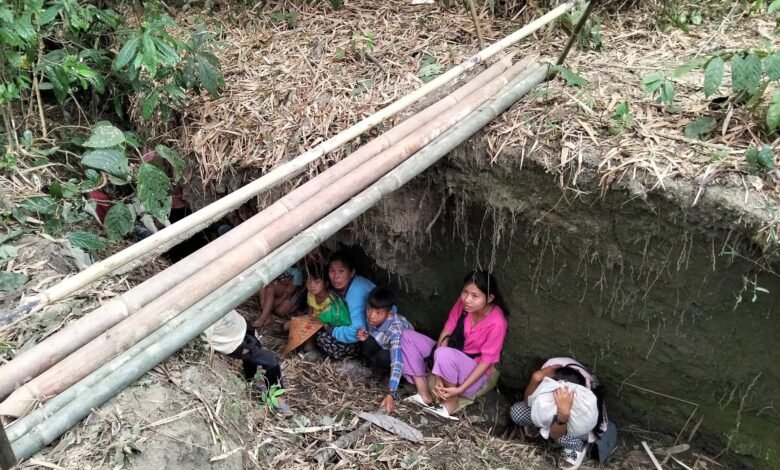Kachin CSOs Call for Urgent International Aid and Civilian Protection on 14th Anniversary of resumed Conflict in the Kachin Region

On the 14th anniversary of the resumption of armed conflict in Myanmar’s northern Kachin State, a strategically important region bordering China, predominantly inhabited by the Kachin ethnic minority, 24 Kachin civil society organisations (CSOs) have issued an urgent appeal to the international community. They are calling for a significant increase in humanitarian aid and robust protection for civilians caught in the intensifying fighting across northern Myanmar.
In a powerful statement released on 9 June, the groups specifically demanded enhanced international support for the more than 232,000 internally displaced persons (IDPs) in Kachin State. They also called for the prioritisation of civilian protection in accordance with international humanitarian law, and for meaningful international engagement to develop sustainable solutions to Myanmar’s pervasive political crisis that escalated after the 2021 military coup.
Since hostilities resumed in 2011 between the Kachin Independence Army (KIA), the armed wing of the Kachin Independence Organisation (KIO), and the Myanmar military, over 232,000 people have been displaced in Kachin State, according to figures released by the United Nations High Commissioner for Refugees (UNHCR) on 2 June, 2025. This conflict has intensified dramatically following the military coup in February 2021, when the military seized power as the State Administration Council (SAC), now Myanmar’s ruling junta.
Among those displaced are highly vulnerable groups including children, pregnant women, elderly persons, people with disabilities, and mothers with young children. Many are enduring dire conditions in temporary shelters, struggling with severely limited access to essential healthcare, education, and adequate food supplies.
Fighting between the KIA and the military junta has escalated across Kachin State in recent years, forming a key front in the broader nationwide resistance against the junta. Ongoing airstrikes, major troop movements, and junta-imposed road blockades have made it increasingly difficult for independent aid organisations to reach conflict-affected areas. This deliberate obstruction of aid has led to critical shortages of food, medicine, and other vital supplies, further exacerbating human suffering.
“Since the coup, civil society organisations have faced growing risks, including threats, arbitrary arrests, and surveillance, which prevent us from fully voicing the challenges on the ground,” stated Ms. Mali Hka, spokesperson for the 24 signatory organisations. “Now, at this critical moment, marked by increasing military offensives and widespread displacement, we are restating our urgent demands.”
The statement specifically calls on the international community to expand and localize humanitarian relief efforts to effectively reach displaced communities. Locally-led aid initiatives are crucial, as local CSOs possess unparalleled access, cultural understanding, and the ability to ensure long-term sustainability that international stakeholders often lack. Furthermore, the statement demands stringent protection for civilians in accordance with international humanitarian law and robust support for long-term efforts aimed at resolving the political crisis in Myanmar, which includes calls for genuine federal democracy and inclusive political dialogue.
While some displaced families have managed to return to areas now under the control of the KIA and its allied resistance groups, these returnees face immense challenges. They frequently find destroyed infrastructure, a severe lack of public services, and the constant threat of landmines and unexploded ordnance. Basic facilities like clinics and schools remain acutely insufficient.
Others remain trapped in overcrowded camps or informal settlements where external aid is severely limited, and food insecurity is worsening. Cross-border aid delivery, a critical lifeline for many, has been further restricted due to junta-imposed blockades and ongoing supply chain disruptions.
“We have been advocating for locally-led aid efforts for over a year now, recognizing their effectiveness and necessity,” Ms. Mali Hka emphasized. “While some international donors are responding, the reality is that overall support has significantly decreased, and access continues to be systematically blocked by the junta.”
The ceasefire agreement signed between the KIA and the Myanmar military in 1994 collapsed in 2011. This occurred after the military demanded that the Kachin Independence Organisation (KIO) integrate its forces into a Border Guard Force under the controversial 2008 Constitution. The KIO firmly rejected this demand, viewing it as a move to undermine autonomy and subordinate their forces to the central military, leading directly to the resumption of hostilities.
As of August 2024, the UNHCR estimated that over 110,000 people were displaced in Kachin State between 2011 and early 2021. Since the coup, an additional 122,400 people have fled their homes – though the true number is believed to be significantly higher, as many remain unregistered in informal sites due to conflict and access issues.
Civil society groups firmly assert that only genuine international engagement, encompassing diplomatic pressure on the military junta, targeted sanctions, and increased, localized humanitarian funding, can adequately respond to the devastating scale of the ongoing crisis and contribute to peace building in Myanmar.




